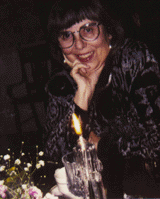
J. Myrne Roe
is honored with a Brick from Jon Roe.
 Back in 1954, when Myrne Roe told her college counselor she was interested in becoming an attorney, he laughed. Women didn't go into law, he explained, and pointed her toward teaching.
Back in 1954, when Myrne Roe told her college counselor she was interested in becoming an attorney, he laughed. Women didn't go into law, he explained, and pointed her toward teaching.
It was the Law's loss. It was also the last time anyone laughed at something Myrne wanted to do. Because, since that time, she has done whatever she aspired to, building at least five illustrious careers in about a decade each, leaving each at the peak of her success and launching a new career with the same results.
She was Myrne Richards - a poor girl from Wellington who could afford college only through a National Methodist Scholarship to Southwestern College in Winfield - when she received the counsel that (as she put it 20 years later in one of two shows she wrote and performed) her career choices were limited to "a teacher, a nurse, a secretary or ... a nun."
When I met her at Southwestern, she was the brilliant and independent student who majored in speech and drama and ignored campus conventions. We married two years later and moved to Wichita where she embarked upon her first career, launching and directing the debate program at Southeast High, then teaching English at South, earning her Master's in Education at Wichita State and joining the Speech Department to teach courses ranging from Interpersonal Communications to Black Rhetoric. She also acted in University and Community Theatre productions.
The shows she wrote in the 70's (A reader's theater production entitled "What Do You Want to Be When You Grow Up, Little Girl?" and a one-woman show called "Several of My Sisters") reflected her leadership in the struggle for women's rights. Her second decade-long career, one of social activism, saw her write Kansas' first feminist column - "Kindly Call Me Ms" - in the Wichita Independent Newspaper, serve as the first woman President of the South Central Kansas Civil Liberties Union and as Executive Director of Planned Parenthood. She was also a founding member of such organizations as the Wichita Commission on the Status of Women and the Women's Crisis Center. She fought inequality wherever she found it, which led to some strange battlefields such as the Wichita Public Library, where she successfully overturned the policy of refusing to issue a woman a library card unless a man vouched for her.
She began working in local, state and national political campaigns in the 70's, and in 1976 ran the campaign that elected her former high school debate student, Dan Glickman, to Congress. Thus began her third career, as Glickman's chief of staff from 1976-85 and 1989-91, during which time she was consulted by many, feared by some and hailed as a political guru, as well as a constant voice of reason, conscience and compassion. Through it all, she was a loving, nurturing role model for our son, Matt, who summed up that side of her nature at her 40th birthday party when he toasted her a "Super Mom."
Her fourth career came in 1985, when she became Executive Director of University Communications at Wichita State, a position in which she led her staff to several national awards for publications and event planning, and led to her being honored as Public Relations Professional of the Year 1988 by the Wichita Chapter of the Public Relations Society of America.
Career number five came in 1991, when she joined the editorial board of the Wichita Eagle and launched a column that was syndicated in newspapers throughout the United States. During this period, she learned that the depression she had battled all her life was due to a chemical imbalance and could be controlled through medication. Her columns on depression and its treatment affected many readers all across the country, and won her awards from such groups as the Sedgwick County Department of Mental Health Advisory Board, Project Awareness, the Kansas Alliance for the Mentally Ill and the Mental Health Association.
In 1997, she and I retired to Lindsborg, where she continues to hear almost daily from those whose lives she touched as teacher, mentor and friend. She is now writing books which will - I know for a certainty - continue to aid and inspire others for many years after she's gone.
Meanwhile, although she says she loves retirement and although I hope to have her with me as much as possible, I wouldn't be at all surprised to hear her announce some day soon that she's decided to go to law school.
And if she does, you can be sure I won't laugh.
September 18, 1998










